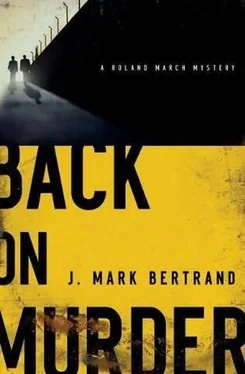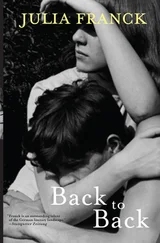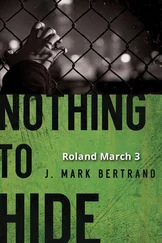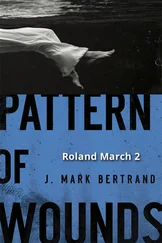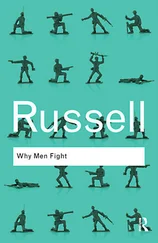“I don’t have to tell you men, but this was one of our own. Let’s get the job done, all right? Quick and thorough.”
The sky rumbles and we all gaze upward, as if it might have something to say. It doesn’t, so the team breaks up, heading into the gray morning on a perfunctory hunt.
Edgar Castro comes up to me, a plastic evidence bag dangling from his hand. Inside, a mobile phone buzzes silently, the screen illuminated. The name on the display reads stef. Bascombe reaches for the bag, quizzing me with a raised brow.
“The wife,” I say.
He draws his hand back. “Ah. We better get the notification taken care of.”
“You want to come along?”
From the way he recoiled from the ringing phone, I already know the answer. But Bascombe surprises me by saying yes. He notifies the captain, then motions to my car. “You drive.”
Stephanie Thomson comes to the door with dried mascara on her cheeks, wearing an oversized men’s button-up shirt and a pair of loose-fitting cotton shorts. She’s younger than I expected, more Cavallo’s generation than mine and Thomson’s, pretty but with the lined, hollow-cheeked look that comes from hard drinking. Her nose and the rim of her eyes shine pink. In her tight-packed fist, a puff of damp Kleenex juts from between the knuckles. Bascombe shows his badge and makes the introductions, setting off more tears.
“It’s all right,” I say, putting an arm over her shoulders, guiding her to a brown recliner in the apartment’s open living room. Of course it’s not all right. It’s terrible and will only get worse. But I speak the words out of reflex, prompted by emotional muscle memory. When people cry, you tell them not to. The first impulse is to take the pain away, because if you don’t, how can you give any comfort?
Bascombe crouches wide-legged at the edge of the sofa, leaning toward her with his hands intensely clasped. He looks like he’s about to break the news, but no words come out of his mouth. I kneel beside the recliner, taking her hand.
“I have something to tell you, Stephanie – ”
“Is it Joe?” she asks, nodding her head over and over. “It’s Joe, isn’t it? I’ve been trying to call him all night, and he never answers. I knew something was wrong, I just knew. Is he…?”
“He’s dead,” I say. No use in dragging it out. “His body was discovered earlier this morning. He was sitting behind the wheel of his vehicle, pulled over on the side of the road. He had his pistol in his hand, and a gunshot wound to the head.”
Her tear ducts open up, expelling a river of glistening salt, an impossible current pulsing out in silence. Shaking from the shoulders down through to the knees, an involuntary tremor, reminding me of a marble column under earthquake pressure, the dusty cracking that presages impending collapse.
“He shot himself,” she says, nodding violently, so certain. “He did that to himself.”
“We’re still conducting our investigation, but – ”
“How could he…?” Her mouth widens, like she’s trying to swallow something too large. “He did that to himself?”
Suddenly she’s slamming her fists against the armrests, kicking her legs, screaming in unintelligible, angry spasms. Bascombe springs forward, pinning her arms like he thinks she’s having a seizure. I stand back and let him do it. After a few moments she goes limp in his arms and starts crying again. I go into the kitchen and look for a glass, pouring water I found in the refrigerator door. When I return, putting the glass on the table beside her, she’s clotting her tears with a fistful of tissue. Bascombe is back on the couch, looking ready to pounce at a moment’s notice.
“I know this is hard, but I do need to ask some questions. And we’d like to take a look around, too, if that’s all right. It’s standard in a case like this.”
“Did he leave a note?” she asks, her voice weak.
“Not that we know of. I was thinking he might have left you a voicemail message?”
She shakes her head. “I’ve been checking my cell and the home number, thinking maybe… but there’s nothing.”
I hand her the water glass, which she examines with a bleak stare. Instead of hammering her with questions right away, I ask permission to take a look around. She consents with a flick of the hand. The lieutenant sticks to the couch, motioning me to go ahead. As I walk down the hallway toward the bedroom, I can hear him speaking softly to her.
The apartment is small but quite nice, recent construction with a hardwood entry, slate-colored tile on the kitchen floor, granite counters and stainless sinks, completely at odds with the couple’s furniture, which I’m guessing is a mix of family hand-me-downs and big-box economy buys selected with an eye to comfort, not looks. The kind of place Charlotte would turn her nose up at, but exactly what I’d expect, given what I know about the Thomsons’ history. I’m guessing this is where Stephanie landed after the divorce, and Joe moved some of his things in when they remarried.
At the back of the hallway there’s a bedroom and bath on one side and a small home office on the other. I step into the office, noting a dusty-screened computer and a stack of printouts which turn out to be real estate listings annotated in loopy, feminine handwriting. In the corner, a half-open closet door beckons. Behind a series of Men’s Wearhouse suits, mostly black and blue solids, I find several rifle cases. Inside one, a padded plastic case, I find a bolt-action hunting rifle with a scope. The next contains a flat-top AR-15 carbine with a telescoping stock and a nice acog sight on the rail. The third case is a short nylon number with narrow pouches on the side for extra magazines. About the right size for a swat-style 9mm submachine gun, but I can tell from its slack droop that the case is empty. I unzip it anyway just to be sure.
Across the hall, I note the rumpled bedcovers, the framed wedding and honeymoon photos on the dresser – dating back maybe five years at most, making the original marriage more recent than I’d supposed – and a tangle of dirty clothes on the floor. On Thomson’s nightstand, there’s a stack of paperback books, including a new-looking copy of The Kingwood Killing with a bookmark halfway through. Inside the cover, a receipt from Murder by the Book, a local independent on Bissonnet specializing in all books crime-related, dated last Saturday, the day after I joined the Morales investigation. So Thomson was doing his homework. Inside the nightstand drawer, a loaded.357 Magnum snub nose, one of those weightless titanium numbers that’s easy to carry and excruciating to shoot, fitted with a Crimson Trace laser grip.
As I close the drawer, Bascombe leans into the bedroom, waving his phone. “Can you sit with her, March? I’ve got to take this outside.”
He exits the apartment, leaving me alone with Stephanie Thomson. She slumps sideways in the recliner, exhausted, quiet apart from the occasional sniffle. I know from experience she’s not done crying. It’ll come in waves, interrupted by surprising, clearheaded stillness, a constant ebb and flow between mind and heart.
“Has Joe been depressed recently?” I ask.
“Not the past couple of days. But before that, yeah. For the past week, it was like living with the old Joe. The bad one. We only got back together a few months ago, and he seemed like a changed man – the one I married, instead of the one I divorced.”
“He’d taken up art, I hear.”
She gives me a long look. “He’d taken up something, anyway.”
“What do you mean?”
She shakes her head. “It doesn’t matter now.”
“Please,” I say. “The more information I have about his state of mind, the better.”
She wipes her eyes, gives her nose a hard rub, sitting up straight in the recliner. “Then here’s the story, for better or worse. Just recently something changed, and the old Joe was back. He said he wasn’t drinking, but I knew better. He has this duffel bag he carries his gear in, and I looked inside and found something.”
Читать дальше
